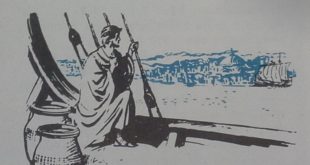Christianity was the movement that spread Across the Roman Empire Pointing the way for the rest of the ancient world toward belief in a single God. The year is 400 A.D. Andropolos paces impatiently up and down the deck of the merchant ship. He is eager to get back home; and to Andropolos, home is the city of Constantinople, a new capital of the Roman Empire. He can already see the walls and buildings of the great city shimmering in the distance. Now the ship is nearing the narrow Bosporus, the waterway where Europe and Asia are hardly a mile …
Read More »Tag Archives: Metropolitan
Russia Under the Tsars 1462-1796
IN THE LAST PART of the fifteenth century, the monks and courtiers of Moscow began to say that Moscow was destined to become the “Third Rome.” The first Rome, they said had been great as the centre of Christianity; but when the Romans had recognized the pope, Rome had been punished by destruction. The second Rome had been Constantinople, the centre of the Orthodox Church; but Constantinople, too, had briefly recognized the pope, and it, too, had fallen. Now Moscow, where the Orthodox faith still remained pure, was to become the Third Rome — the great centre of the Christian …
Read More »
